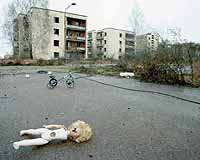 |
Caracas (AFP) April 3, 2010 Russia has agreed to help Venezuela set up a nuclear power plant for the "post-oil" era, President Hugo Chavez said as the two countries deepened military, energy and financial ties. Russian Prime Minister Vladimir Putin, on his first visit to Latin America's biggest oil producer, also vowed to help Venezuela launch its own space industry and the two countries inked a multimillion-dollar oil deal. "We're not going to build an atomic bomb, but we want to develop nuclear energy for peaceful purposes," Chavez said. He was speaking one year after he signed an agreement to that end with Russian President Dmitry Medvedev during a visit to Moscow. Putin was received with military honors Friday at Caracas international airport by Chavez, a leftist firebrand who has signed a dozen military agreements with Moscow since 2005 worth some 4.4 billion dollars. Putin said Venezuela had yet to use any of the 2.2 billion dollars Russia has agreed to lend the South American country for further arms deals. To underscore the allies' military cooperation, a huge Russian Antonov 124 cargo plane landed in Caracas delivering four Russian Mi-17 helicopters to Venezuela's defense minister, General Carlos Mata. Venezuela recently won a two-billion-dollar credit from Russia to buy T72 armored vehicles and anti-aircraft systems, raising concerns in Washington, which has called for transparency. Last week, Chavez thanked Russia for helping Venezuela "bolster its defensive potential" in the face of "threats" from the United States. "Venezuela has already entered the satellite, space race. Russia's experience is gigantic in this regard," Chavez said during a joint press conference with Putin, who left early Saturday. "We could even install a satellite launcher here and a factory. We are already doing so with China, but Russia is offering to support Venezuela build its own (space) industry." Putin and Chavez began with a visit to a Russian merchant marine fishing vessel, which will be used to train Venezuelan sailors. From there, they placed a wreath at the tomb of Venezuelan independence hero Simon Bolivar, followed by a private meeting at the Miraflores presidential palace, after which they signed more than two dozen agreements. The accords will bring Venezuela "to the next phase of cooperation with Russia, which no longer will be limited to energy and military matters, but now also includes social, cultural and health issues," Vice President Elias Jaua on state-run VTV television ahead of Putin's visit. Topping the list was an agreement to set up a Russian-Venezuelan development bank to finance a joint venture for oil and gas exploration in eastern Venezuela's oil-rich Orinoco river basin. The enterprise -- 60 percent owned by Venezuela, 40 percent by a consortium of Russian companies -- hopes to extract up to 450,000 barrels of oil per day from the Amazon region. Putin handed Chavez a 600-million-dollar check from the Russian consortium toward an initial one-billion-dollar investment in the joint venture. "We won't let you down," Chavez told Putin during the signing ceremony. Putin and Chavez also signed cooperation deals in agriculture, transportation and catastrophe prevention, according to the meeting agenda. There was no mention about an agreement on Venezuela's space program. US State Department spokesman Philip Crowley said the two nations had the right to pursue relations with whoever they chose, but questioned Venezuela's priorities. "We would note that the government of Venezuela was largely closed this week due to energy shortages and to the extent that Venezuela is going to extend resources on behalf of its people, perhaps the focus should be more terrestrial than extraterrestrial," he said. Links between Venezuela and Russia have grown in recent years, with Russian President Dmitry Medvedev visiting Venezuela in late 2008 during joint naval exercises, while Chavez visited Moscow in September. Bolivian President Evo Morales also arrived late Friday in Caracas and met with Chavez and Putin, but nothing was said later about his announced request for a 100-million-dollar loan from Russia to purchase helicopters and other military hardware for counternacotics efforts. The Russian equipment would include an Antonov aircraft for Morales's use.
Share This Article With Planet Earth
Related Links Nuclear Power News - Nuclear Science, Nuclear Technology Powering The World in the 21st Century at Energy-Daily.com
 Lithuanian petition rejects Belarus nuclear plant
Lithuanian petition rejects Belarus nuclear plantVilnius (AFP) April 1, 2010 More than 20,000 Lithuanians have signed an electronic petition to the government against the planned construction of a nuclear power station in neighbouring Belarus, organisers said Thursday. Belarus plans to build a new nuclear plant that could possibly export energy to Lithuania. Lithuania agreed to close its own Soviet-era Ignalina nuclear station by 2009 as part of its 2004 EU accession ... read more |
|
| The content herein, unless otherwise known to be public domain, are Copyright 1995-2010 - SpaceDaily. AFP and UPI Wire Stories are copyright Agence France-Presse and United Press International. ESA Portal Reports are copyright European Space Agency. All NASA sourced material is public domain. Additional copyrights may apply in whole or part to other bona fide parties. Advertising does not imply endorsement,agreement or approval of any opinions, statements or information provided by SpaceDaily on any Web page published or hosted by SpaceDaily. Privacy Statement |